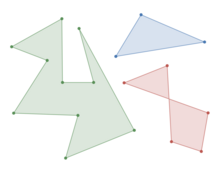
Back مضلع بسيط Arabic Polígon simple Catalan Einfaches Polygon German Απλό πολύγωνο Greek Polígono simple Spanish چندضلعی ساده Persian Yksinkertainen monikulmio Finnish Polygone simple French सरल बहुभुज Hindi Egyszerű sokszög Hungarian

In geometry, a simple polygon is a polygon that does not intersect itself and has no holes. That is, it is a piecewise-linear Jordan curve consisting of finitely many line segments. These polygons include as special cases the convex polygons, star-shaped polygons, and monotone polygons.
The sum of external angles of a simple polygon is . Every simple polygon with sides can be triangulated by of its diagonals, and by the art gallery theorem its interior is visible from some of its vertices.
Simple polygons are commonly seen as the input to computational geometry problems, including point in polygon testing, area computation, the convex hull of a simple polygon, triangulation, and Euclidean shortest paths.
Other constructions in geometry related to simple polygons include Schwarz–Christoffel mapping, used to find conformal maps involving simple polygons, polygonalization of point sets, constructive solid geometry formulas for polygons, and visibility graphs of polygons.



